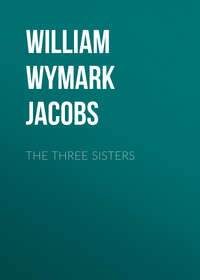Książki nie można pobrać jako pliku, ale można ją czytać w naszej aplikacji lub online na stronie.
Czytaj książkę: «The Three Sisters»
THE THREE SISTERS
Thirty years ago on a wet autumn evening the household of Mallett's Lodge was gathered round the death-bed of Ursula Mallow, the eldest of the three sisters who inhabited it. The dingy moth-eaten curtains of the old wooden bedstead were drawn apart, the light of a smoking oil-lamp falling upon the hopeless countenance of the dying woman as she turned her dull eyes upon her sisters. The room was in silence except for an occasional sob from the youngest sister, Eunice. Outside the rain fell steadily over the steaming marshes.
"Nothing is to be changed, Tabitha," gasped Ursula to the other sister, who bore a striking likeness to her although her expression was harder and colder; "this room is to be locked up and never opened."
"Very well," said Tabitha brusquely, "though I don't see how it can matter to you then."
"It does matter," said her sister with startling energy. "How do you know, how do I know that I may not sometimes visit it? I have lived in this house so long I am certain that I shall see it again. I will come back. Come back to watch over you both and see that no harm befalls you."
"You are talking wildly," said Tabitha, by no means moved at her sister's solicitude for her welfare. "Your mind is wandering; you know that I have no faith in such things."
Ursula sighed, and beckoning to Eunice, who was weeping silently at the bedside, placed her feeble arms around her neck and kissed her.
"Do not weep, dear," she said feebly. "Perhaps it is best so. A lonely woman's life is scarce worth living. We have no hopes, no aspirations; other women have had happy husbands and children, but we in this forgotten place have grown old together. I go first, but you must soon follow."
Tabitha, comfortably conscious of only forty years and an iron frame, shrugged her shoulders and smiled grimly.
"I go first," repeated Ursula in a new and strange voice as her heavy eyes slowly closed, "but I will come for each of you in turn, when your lease of life runs out. At that moment I will be with you to lead your steps whither I now go."
As she spoke the flickering lamp went out suddenly as though extinguished by a rapid hand, and the room was left in utter darkness. A strange suffocating noise issued from the bed, and when the trembling women had relighted the lamp, all that was left of Ursula Mallow was ready for the grave.
That night the survivors passed together. The dead woman had been a firm believer in the existence of that shadowy borderland which is said to form an unhallowed link between the living and the dead, and even the stolid Tabitha, slightly unnerved by the events of the night, was not free from certain apprehensions that she might have been right.
With the bright morning their fears disappeared. The sun stole in at the window, and seeing the poor earth-worn face on the pillow so touched it and glorified it that only its goodness and weakness were seen, and the beholders came to wonder how they could ever have felt any dread of aught so calm and peaceful. A day or two passed, and the body was transferred to a massive coffin long regarded as the finest piece of work of its kind ever turned out of the village carpenter's workshop. Then a slow and melancholy cortege headed by four bearers wound its solemn way across the marshes to the family vault in the grey old church, and all that was left of Ursula was placed by the father and mother who had taken that self-same journey some thirty years before.
